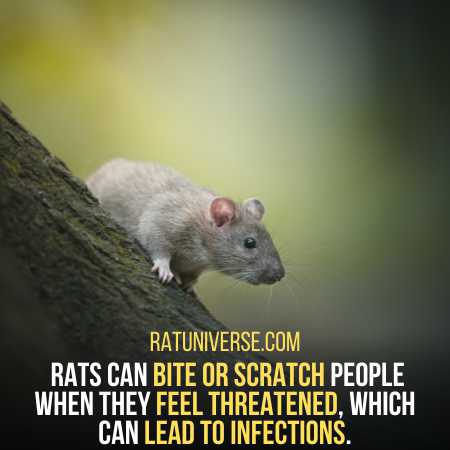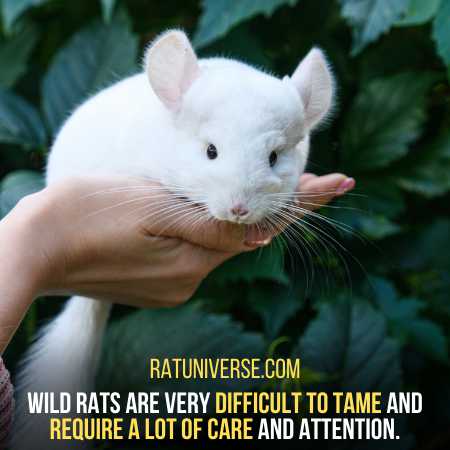There are many reasons why you should not to own a wild rat as a pet.
While they might seem cute and harmless, wild rats can actually be quite dangerous.
What will I learn?
They can carry diseases, contaminate food, and even damage your home.
So if you’re thinking about getting a wild rat as a pet, you should think twice. It’s not worth the risk.
Why Not Own a Wild Rat – 10 Solid Reasons
In this blog post, we will share the reason you should avoid owning a wild rat. Here are ten of the most important ones.
1. Wild Rats can Carry Diseases.
Some of the diseases that wild rats can carry include bubonic plague, typhus, and hantavirus. These diseases can be transmitted to humans through contact with the rat’s urine, feces, or saliva. Symptoms of these diseases include fever, chills, headaches, body aches, and vomiting. In severe cases, these diseases can be fatal.
Additionally, wild rats are known to carry fleas and ticks, transmitting diseases to humans. These diseases include Lyme disease, Rocky Mountain spotted fever and others.
So if you’re thinking about getting a wild rat as a pet, you should definitely reconsider. The risks are just too high.
2. They can Damage Property.
Wild rats are notorious for chewing through walls, wires, and pipes in homes. This can cause severe damage to your property and even start electrical fires.
Chewing through wires is one of the leading causes of house fires in the United States.
If you have wild rats on your property, it’s important to prevent them from getting inside your home.
3. Wild Rats are Often Very Aggressive.
Wild rats are often very aggressive, especially when they feel threatened. They can bite or scratch people, which can lead to infections.

They can also transmit diseases to humans through their bites and scratches. So it’s important to be careful around wild rats and avoid getting too close to them.
One of the main reasons experts are against keeping wild rats as pets is because rats can be aggressive.
4. Reproduce Very Quickly
Wild rats reproduce quickly, so one rat can turn into an infestation in a short period of time. If you have wild rats on your property, it’s important to take measures to prevent them from multiplying.
Rats can have up to 12 babies at a time and can reproduce every three months. So if you’re thinking about getting a wild rat as a pet, you should really think twice.
5. Rats are Garden Eaters
Rats are known to eat a variety of plants and flowers. If you have a garden, the chances are that rats will eat your plants and flowers if they get the chance.
This can be a big problem for gardeners who spend a lot of time and money growing their plants.
So if you’re thinking about getting a wild rat as a pet, you should know that they could ruin your garden.
6. Difficult to Get Rid of.
Once wild rats have established themselves in your home, they can be very difficult to get rid of. They reproduce quickly and can squeeze into small spaces, making them hard to catch.

If you have wild rats in your home, the best action is to call an exterminator. Attempting to get rid of wild rats on your own can be very difficult and time-consuming.
Exterminators are trained professionals who know how to get rid of wild rats quickly and efficiently.
7. Wild Rats are Difficult to Catch When Espace
If you have a wild rat as a pet and it escapes, it can be tough to catch. They are good at hiding and squeezing into small spaces.
We get emotionally attached to the pets and animals we keep as human beings. Losing a pet can be devastating, but it’s important to remember that wild animals are not meant to be pets.
They can be dangerous and pose a risk to your health and safety.
8. Hard to Tame.
Wild rats are very difficult to tame and require a lot of care and attention. They are also very active and need a lot of space to run around.

They always need attention, and if you don’t give it to them, they will become bored and destructive.
If you’re thinking about getting a wild rat as a pet, you should be prepared to devote a lot of time and energy to caring for it.
Taming a wild rat is not easy and requires patience and consistency.
They are also very active, so they need a lot of space to run and play.
Without the proper care, wild rats can become destructive.
9. Wild Rats can be Expensive to Care for Properly
Wild rats can be expensive to care for properly. They need a lot of food and water, and they also need a place to live that is safe from predators.
They also need to be vaccinated against diseases, which can cost a lot of money.
There’s no such pet insurance for wild rats as compared to domestic pets.
If your wild rat gets sick, you will have to pay for the veterinary care yourself.
So if you’re thinking about getting a wild rat as a pet, you should be prepared to spend a lot of money on its care.
While some people might think that rats are cheap to care for, the truth is that they can be quite expensive.
10. They can Contaminate Food
Another reason why you should not own a wild rat is that they can contaminate food with their droppings or urine.
Rats are known to urinate and defecate wherever they go, which means that your food could quickly become contaminated if you have a wild rat in your home.
This is especially dangerous for young children or people with weakened immune systems.
If you are a family person with children and elders at home, it is best not to have a wild rat as your pet. It’s not a suggestion, it’s a caution.
Conclusion:
If you’re thinking about getting a wild rat as a pet, you should know that they can be difficult to take care of and expensive. Wild rats also pose a risk to your health and safety due to their ability to contaminate food with their droppings or urine. Finally, they can be hard to get rid of if they escape. We suggest that you should not own a wild rat.
FAQs
Can I keep a wild rat as a pet?
No, we do not recommend keeping a wild rat as a pet.
Why you shouldn’t own a rat?
There are many reasons why you shouldn’t own a rat. They can be difficult to take care of, expensive, and risk your health and safety.
Can wild rats make good pets?
No, wild rats do not make good pets. They can be difficult to take care of and expensive.
Do wild rats carry disease?
Yes, wild rats can carry diseases. They can also contaminate food with their droppings or urine.

Leave a Reply